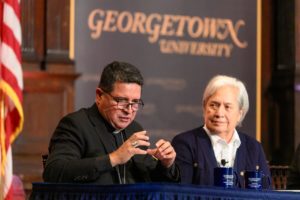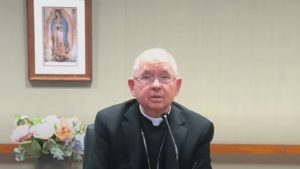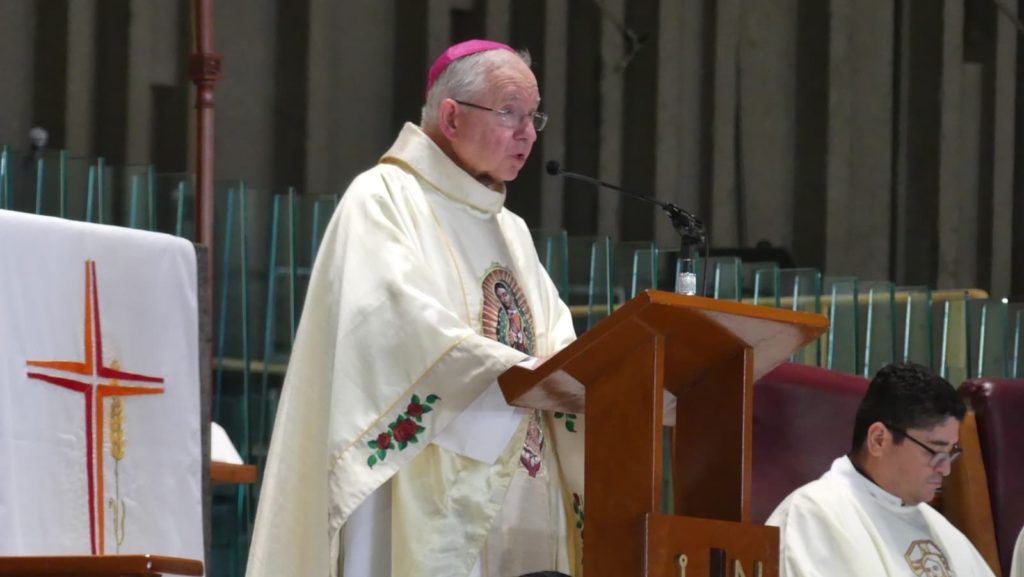Archbishop José H. Gomez called for federal immigration reform “that responds to the reality of our country” at a Washington, DC panel discussion with other U.S. Catholic leaders in the wake of this summer’s federal immigration raids.
“The most important thing is to help people to understand the dignity of the human person. Deportation is not an immigration policy,” said Archbishop Gomez at the Sept. 11 livestreamed event hosted by Georgetown University’s Initiative on Catholic Social Thought & Public Life.
“We really need to find a way to have immigration reform that responds to the reality of our country.”
Titled “Deportations and Assaults on Human Dignity: on Catholic Principles, Human Costs, and Pastoral Challenges,” the archbishop and the seven other panelists spent nearly two hours discussing the consequences of the Trump administration’s “enforcement only” approach to immigration and the need for “conversion” for Americans who have forgotten the country’s immigrant heritage.
“It is true that we need to protect our borders,” said Archbishop Gomez, who participated in the event via Zoom. “But at the same time [immigration has] been part of the history of the United States from the very beginning. That’s the reality that we need to be aware of to find the solution at this time.”
In his remarks, Archbishop Gomez spoke of the Archdiocese of Los Angeles’ various efforts to respond to the fear produced by the immigration sweeps in schools and parishes, where LA priests have reported that “at least 30% of people attending Mass aren’t coming anymore.”
The archbishop said those efforts have included legal help for people detained — sometimes wrongly — food banks and donation drives for affected families, and the Family Assistance program established to support families struggling after the deportation of breadwinning relatives.
Other panelists included El Paso Bishop Mark Seitz, chairman of the U.S. Bishops’ immigration committee, and Sister Norma Pimentel, executive director of Catholic Charities of the Rio Grande Valley.

One of the panelists, Auxiliary Bishop Evelio Menjivar of Washington, DC, likened the sense of fear during the civil war in his native El Salvador to the climate caused by the Trump administration’s increased immigration enforcement, which has included raids on city sidewalks and parking lots that many, including a federal judge, said was racial profiling.
“When people were kidnapped, when people were taken by death squads, when they would disappear by the guerilla, people used to say, ‘Se lo llevaron,’ ” recalled Menjivar, who fled the war as a teenager and first immigrated to the U.S. illegally in 1990.
“This is the level of terror that people are feeling,” including the children of immigrants, said Menjivar.
Ashley Feasley, the legal expert in residence at the Immigration Law and Policy Initiative at The Catholic University of America Columbus School of Law, noted there is bipartisan support for long-standing restrictions on ICE agents from making arrests at what are seen as sensitive locations, including houses of worship, schools and hospitals.
But when the Trump administration tried to alter that policy, they changed it for a policy that is "less clear."
"I think this is an area, particularly if the Trump administration is talking about religious liberty, that would go a long way to talk to the bishops about, you know, what is this policy?" Feasley said. "What can be done, particularly as it relates to houses of worship and access to ... the sacraments?"
"I think there are decision-makers there who would understand it that way," she said.
Another panelist, Nichole Flores, an associate professor of religious studies at the University of Virginia who studies the relationship between Catholicism and democracy, said the principles that "guide our reflection on immigration are threefold, one that human beings do have the right to to migrate, but also that countries such as the United States have the right and even the duty to regulate our borders."
"But a third principle helps us to hold together those two principles that seem to some to be contradictory, that the work of immigration enforcement should be guided by justice and mercy," said Flores, who is the author of "The Aesthetics of Solidarity: Our Lady of Guadalupe and American Democracy."

Archbishop Thomas Wenski of Miami spoke of his efforts to convince officials at the new federal detention facility Florida’s Everglades, known as “Alligator Alcatraz,” to allow Catholic priests to celebrate Mass for detainees.
Allowing detainees to pray, even if they’re not at the facility for more than a few weeks, said Wenski, was a matter of human dignity, even for people placed in “a very dehumanizing situation.”
“It’s a way of telling them they’re not alone, they’re not forgotten,” said Wenski. “And more importantly, of telling them God is with them.”
Wenski acknowledged that the vast majority of undocumented immigrants in the U.S. are here “precisely because there’s a need for them” in work sectors such as agriculture, healthcare, and the service industry. Due to the lack of immigration reform, these are people “being broken by the law, and not breaking the law so much,” he said.
“We want the biggest economy ever,” said Wenski. “But you’re not going to have the biggest economy ever without taking into account the labor force participation of the immigrants.”
In remarks towards the end of the panel, Archbishop Gomez sounded a hopeful note about the chances for meaningful change on immigration, despite the ongoing situation.
“I think we’ll have immigration reform very soon,” said Archbishop Gomez. “Let’s all keep working for that. That’s my prayer and my dream.”
OSV News’ Kate Scanlon contributed to this report.

